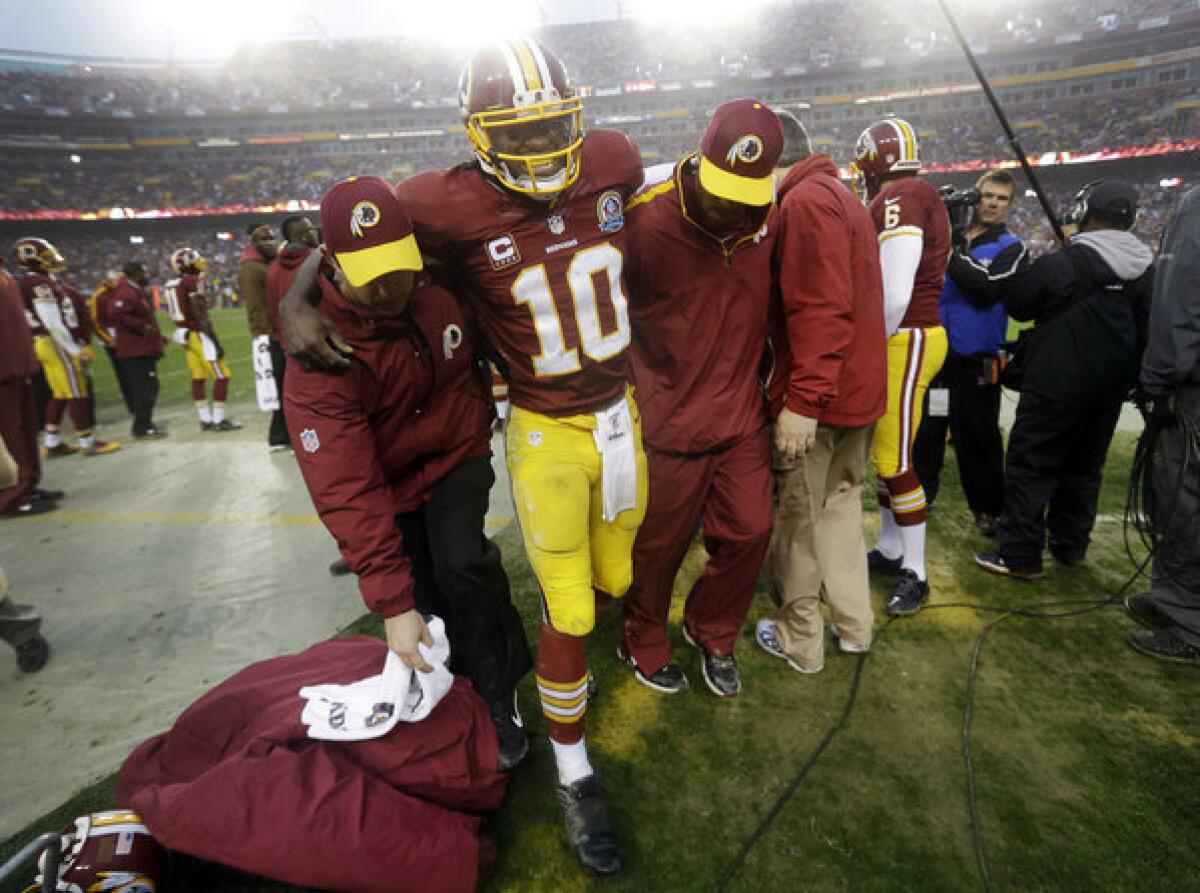Why the NFL and NBA should help promote Obamacare

- Share via
Leading congressional Republicans are trying to stop professional sports leagues from encouraging Americans without health insurance to sign up for coverage. Why? Because that would further entrench a law -- the Patient Protection and Affordable Care Act, otherwise known as Obamacare -- they’re still trying to repeal.
Granted, I support the Affordable Care Act, as flawed as it may be. But the GOP’s actions still strike me as cutting off one’s constituents to spite the president.
The law’s new insurance regulations and premium subsidies are hugely beneficial to those who’ve been red-lined or priced out of the private insurance market. Letting people know about the availability of coverage through new insurance exchanges, with subsidies for households earning less than four times the federal poverty level, isn’t just in the public interest -- it’s essential to the ultimate success of the law’s insurance reforms.
That’s why officials at the U.S. Department of Health and Human Services have been discussing potential partnerships with professional sports leagues and other groups to educate the public about the new insurance benefits. After HHS Secretary Kathleen Sibelius announced the effort last week, however, top Republicans in the Senate and the chairman of the House Republican Study Committee sent letters to the commissioners of the National Football League and the National Basketball Assn. urging them not to get involved.
An NFL spokesman responded by saying the league hadn’t talked really talked to the administration about the issue and had no plans to take part. Score one for the GOP!
I’m well aware of the GOP’s argument that the law is bad for the country. The new insurance subsidies are costly, and the regulations will force younger, healthier people to pay more for coverage than they do today. Those criticisms aren’t mere speculation, they’re borne out by the initial premiums announced by several of the state insurance exchanges.
But it’s one thing to argue in favor of changing the law, it’s another to try to prevent the government from implementing it successfully.
The new rules for insurers, including a prohibition on insurers cherry-picking customers or charging higher premiums based on someone’s medical history, are designed to extend coverage to a higher percentage of the public. Yet they could lead public and private insurers’ costs to spiral out of control if only the sickest and riskiest individuals sign up for policies. There’s also the risk of snafus at the exchanges discouraging people from signing up.
The biggest potential problem, though, is a lack of awareness or understanding of what will be available in 2014, when the new law’s main provisions go into effect. Without a broad public education campaign, too few of the younger, healthier people who are eligible for premium subsidies will learn that they’re available or understand how the subsidies change the value proposition for them. That’s because this demographic tends to be less engaged and informed than older adults.
This group also happens to be one of the main markets targeted by pro sports leagues such as the NBA and the NFL. Their teams also are also living, breathing advertisements for the U.S. healthcare system, given how many of their stars get carted off to the hospital during games (see Robert Griffin III, above).
In fact, when Massachusetts was implementing its own healthcare reform law (a.k.a. Romneycare), members of the Boston Red Sox taped commercials alerting fans about the provisions of the law and urging them to visit a state website for more information. The team also provided space at Fenway Park for the state’s new insurance exchange to set up an information booth.
If the young and healthy stay on the sidelines, that could hasten the collapse of Obamacare. But it would do so at the expense of everyone else in the market for individual policies, whose premiums would skyrocket. That would lead more people to go uninsured, which in turn would lead to more uncompensated and inefficient care, driving up costs for everyone in the system.
In their letter to NFL Commissioner Robert Goodell, Senate Minority Leader Mitch McConnell (R-Ky.) and Minority Whip John Cornyn (R-Texas) made a straightforward, albeit political, argument that the league shouldn’t associate itself with a policy as divisive and disliked as Obamacare. Rep. Steve Scalise (R-La.), the chairman of the House Republican Study Committee, went further in his letter to Goodell and NBA Commissioner David Stern, contending that the leagues would be disserving their fans by partnering with HHS. According to Scalise, the Affordable Care Act is a “train wreck” in the making because of “missed deadlines, implementation delays and programs that are far from ready.”
He may be right about that. But his efforts to keep the public in the dark about the law can only help the disaster he’s predicting come true.
ALSO:
Seize the mortgages, save the neighborhood
Five reasons to stay away from Texas right now
Alec Baldwin needs to get a clue about gay slurs
Follow Jon Healey on Twitter @jcahealey
More to Read
A cure for the common opinion
Get thought-provoking perspectives with our weekly newsletter.
You may occasionally receive promotional content from the Los Angeles Times.











